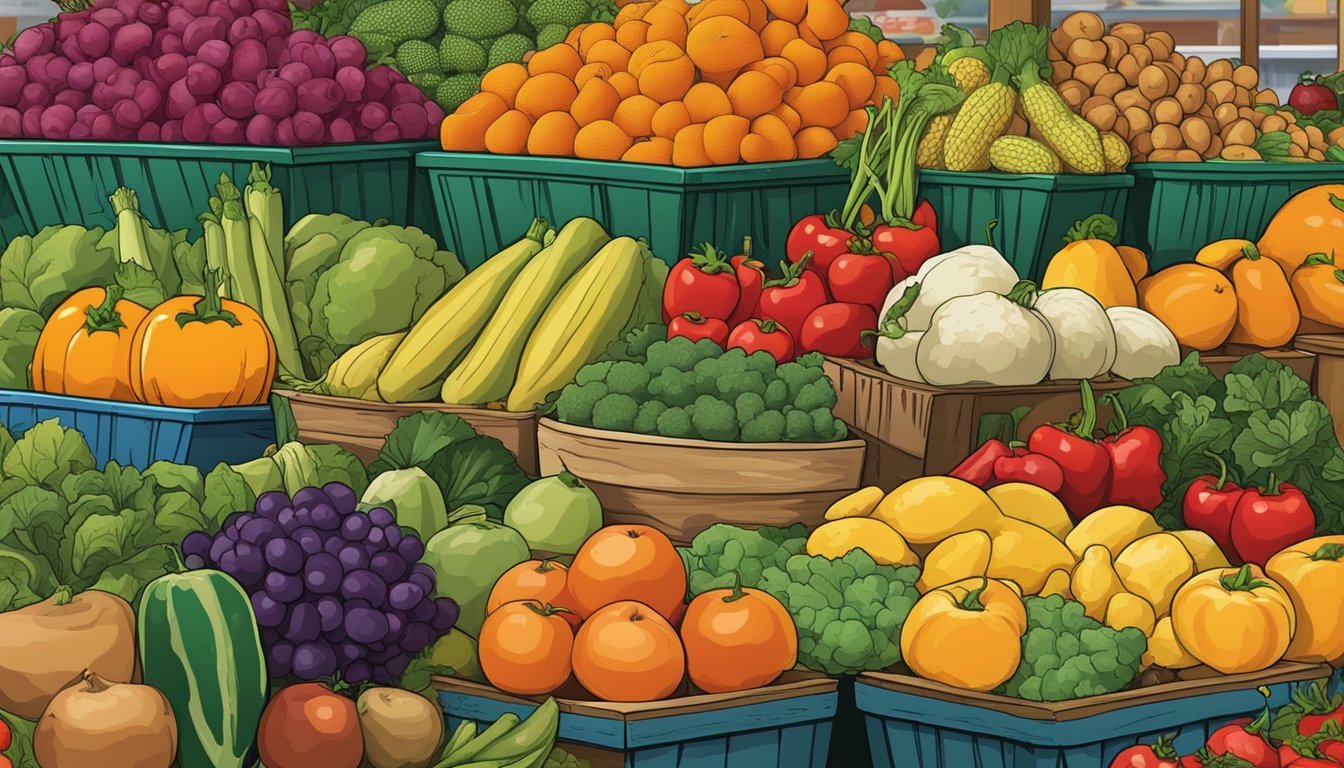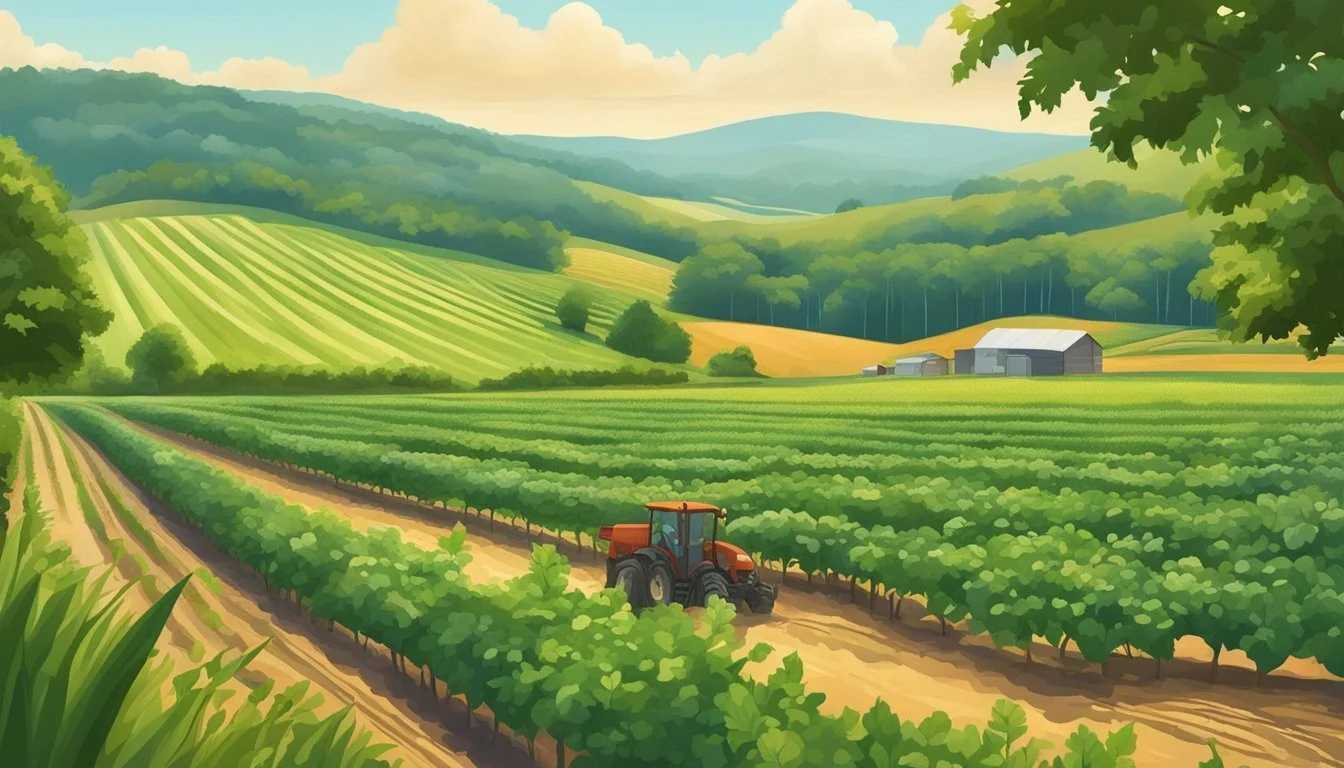Tennessee Seasonal Fruit & Vegetables in August
Your Fresh Produce Guide
This Article is Part of our Tennessee Seasonal Fruit & Veg Calendar
In Tennessee, the warmth of the summer climate extends through August, offering a conducive environment for a vibrant array of fruits and vegetables to thrive. This month is a crucial period for local agriculture, as many crops reach their peak ripeness, providing both a sensory delight and a nutritional boon. Fresh produce harvested during this period not only ensures quality and flavor but also supports the local economy and reduces the carbon footprint associated with long-distance food transportation.
Farmers' markets and orchards across Tennessee become particularly bustling in August with an assortment of summer fruits and vegetables. Apples, a popular fruit often associated with fall, surprisingly begin their peak harvest in mid-August. Varieties such as Rome, Red Delicious, Golden Delicious, and the tangy heirloom Winesaps are ready to be picked and enjoyed. Additionally, the state’s fertile lands yield a rich harvest of vegetables during this time, accentuating the importance of seasonality in consumer choices.
With the focus on seasonality and the benefits of consuming locally grown produce, residents and visitors alike have the opportunity to experience Tennessee's agricultural offerings at their freshest. Whether it's through picking apples directly from the orchard or selecting from the diverse vegetable assortment at the market, August in Tennessee is a testament to the abundance and diversity fostered by the summer season’s generous climatic conditions.
Overview of Tennessee Climate and Its Impact on Agriculture
Tennessee's climate plays a significant role in shaping the state's agricultural output, particularly in the summer months when crop yields are highly sensitive to weather conditions.
Tennessee Summer Climate
During the summer, Tennessee experiences a warm and humid climate, with average temperatures ranging from the mid-70s to the mid-90s Fahrenheit. The state's agriculture benefits from the long growing season, which is conducive to a variety of crops. However, farmers must manage risks associated with high humidity and precipitation, which can lead to crop diseases and pests.
The frequent summer rainfall in Tennessee, while beneficial for soil moisture, can sometimes lead to excess water and flooding, stressing crops. It is important for farms to have proper drainage and irrigation systems in place to handle the variable conditions. The state's resources and agricultural agencies often provide guidance to help farms implement sustainable practices to optimize crop health and yield.
As summer temperatures in Tennessee continue to rise due to changing climate patterns, farmers are adapting their practices. They may shift planting dates, select heat-tolerant crop varieties, and employ water conservation techniques to maintain productivity in the face of the evolving climate.
Given these conditions, Tennessee's summer climate requires farmers to be vigilant and adaptable to ensure the success of their crops. Proper management of resources and staying informed about climate trends is crucial for the sustainability of agriculture in the state.
Seasonal Fruit Availability in Tennessee
In Tennessee, August marks the peak season for an array of fruits. This guide will help identify what's ripe for picking during this month, ensuring the freshest and most flavorful produce.
Berries in August
Blackberries (how long do blackberries last?): August is the tail end of harvest for summer-bearing blackberries. Availability may vary, as some farms extend their season with primocane-bearing varieties.
Blueberries: Although nearing the end of their season, highbush and rabbiteye blueberries are often still available early in the month.
Stone Fruits in Season
Peaches: They are in their prime, with varieties best suited for the Tennessee climate being abundantly available.
Plums: With a variety of plums harvested throughout the summer, some late-ripening plums can still be found fresh in August.
Melons and Tropical Fruits
Melons: August is an excellent time for melons, with ripe cantaloupes (how long does cantaloupe last?) being a particularly sweet choice.
The harvest for tropical fruits in Tennessee is not as prevalent, with local availability being limited compared to other regions. However, one may still find locally grown options at farm stands or markets.
Seasonal Vegetable Harvest in Tennessee
Tennessee's August harvest boasts a rich bounty of fresh produce. In this verdant month, the state enjoys a peak in the ripening of various vegetables ranging from earthy root tubers to vibrant leafy greens.
Root Vegetables and Tubers
Potatoes and beets are prime for digging in Tennessee's August soil. They offer earthy flavors and hearty textures that are essential for many summer dishes. Carrots also reach their peak, providing a sweet crunch in salads and side dishes.
Potatoes: Best for roasting and mashing.
Beets: Ideal for salads, juices or roasting.
Carrots: Perfect for raw snacks, stews, or side dishes.
Leafy Greens and Herbs
Greens such as kale and cabbage thrive during this time, with their leaves being especially tender and flavorful. Herbs like basil and cilantro are abundant, offering a fresh aromatic touch to any dish.
Kale: Sautéed or in salads.
Cabbage: Wonderful in slaws or fermented for sauerkraut (how long does sauerkraut last?).
Basil: A must-have in pesto or as a fresh garnish.
Cilantro: Complements salsas and Asian cuisine.
Summer Squash and Gourds
Zucchini and yellow squash are in their element, perfect for grilling or adding to stews. Squash varieties, including pattypan, bring diversity to the table with their unique shapes and flavors.
Zucchini: Versatile in baking or as zoodles.
Yellow Squash: Tasty when sautéed or grilled.
Pattypan Squash: A treat when stuffed or baked.
Each vegetable listed contributes to the colorful array of Tennessee's August produce. Cooks and consumers alike can take advantage of the fresh, local vegetables harvested during this season.
Local Tennessee Farms and Produce Resources
August in Tennessee brings a bountiful harvest, providing residents and visitors alike with abundant options for fresh produce. Consumers have the opportunity to engage directly with local agriculture through pick-your-own farms and a variety of agricultural attractions.
Pick-Your-Own Farms
Pick-Your-Own Farms, sometimes referred to as U-Pick farms, offer a hands-on experience for those looking to harvest their own fruits and vegetables. In Tennessee, these farms become particularly popular in August, when crops like tomatoes, sweet corn, and peaches reach their peak. Many farms also offer additional attractions like hayrides or picnic areas. Some key resources to find these local farms include PickTnProducts.org and PickYourOwn.ORG, which provide up-to-date listings by county.
Notable Pick-Your-Own Farms:
Smith Farm: Renowned for their heirloom tomatoes and sweet corn.
Oak Grove Orchards: Offers a variety of peaches and nectarines.
Agricultural Attractions
Agricultural attractions in Tennessee are not limited to just picking fruits and vegetables. Visitors can also enjoy pumpkin patches and corn mazes closer to the fall season. These attractions often include other activities such as farm tours, educational exhibits, and market stands selling fresh, farm-made products. Tennessee Ag Enhancement Program is one resource that supports these attractions through funding and resources, ensuring a rich agricultural experience.
Prominent Agricultural Attractions:
Green Meadows Farm: Known for its elaborate corn maze designs.
Pumpkin Hollow: A favorite destination for pumpkin picking with a multitude of pumpkin varieties.
Health Benefits and Nutritional Information of August Produce
In Tennessee, August offers an abundance of fresh produce that boasts significant health and nutritional benefits. Understanding these advantages is key for consumers looking to make informed dietary choices.
Benefits of Seasonal Eating
Eating seasonally in Tennessee during August means enjoying a variety of fresh fruits and vegetables at their nutritional peak. Apples, available in varieties such as Rome and Red Delicious, are a good source of fiber and vitamin C. They can support digestive health and immune system function.
Pumpkins and squash, which begin to make their appearance, are rich in vitamins A and C, as well as fiber. These nutrients are essential for maintaining healthy skin, vision, and immune defense.
Sweet potatoes, another staple of the season, offer a high level of vitamin A, potassium, and antioxidants. These compounds aid in maintaining heart health, reducing inflammation, and enhancing skin health.
Moving onto other seasonal offerings, tomatoes, plump with lycopene, vitamin C, and potassium, contribute to heart health and provide antioxidant properties.
Blackberries, which are plentiful in late summer, are high in vitamins C and K, fiber, and manganese. Regular consumption can support heart health and bone strength.
Here is a table summarizing the nutritional highlights of select produce available in August in Tennessee:
Produce Key Nutrients Health Benefits Apples Fiber, Vitamin C, Potassium Digestive health, Immune support Pumpkins Vitamins A and C, Fiber, Antioxidants Skin health, Vision protection, Immune system support Squash Vitamins A and C, Fiber, Potassium Immune system support, Skin health Sweet Potatoes Vitamin A, Potassium, Antioxidants Heart health, Inflammation reduction, Skin health Tomatoes Lycopene, Vitamin C, Potassium Heart health, Antioxidant properties Blackberries Vitamin C, Vitamin K, Fiber, Manganese Heart health, Bone strength, Immune system support
Consuming fruits and vegetables that are in season not only provides the body with essential nutrients but often offers richer flavors and better prices due to peak harvest abundance. It also supports local agriculture and reduces the ecological footprint associated with long-distance transportation of food products.
Preservation and Preparation Tips for Seasonal Produce
August in Tennessee sees a bounty of fruits and vegetables at their peak. Preserving these items maximizes their lifespan and flavors, while creative preparation helps savor the season's best.
Freezing and Canning
Freezing is ideal for many fruits and vegetables, prolonging their freshness until usage. For example, berries can be frozen on a baking sheet before being transferred to airtight bags, retaining their individual quality. Vegetables such as green beans benefit from blanching prior to freezing to preserve their texture and color.
Canning transforms seasonal produce into jams, preserves, and pickles, extending enjoyment into the cooler months. Stone fruits, like peaches, can be made into jam using proper canning techniques that include the use of pectin (how long does pectin last?) and canning jars.
Cooking and Recipe Ideas
When cooking August's harvest, simplicity allows the natural flavors to shine. Tomatoes can be roasted to enhance their sweetness or incorporated into fresh salsas (how long do fresh salsas last?). Corn adds a crunchy sweetness to salads, or it can be grilled for a smoky flavor.
Recipes that blend seasonal items create delightful meals. Zucchini can be spiralized into noodles or mixed into casseroles. Bell peppers, stuffed with a mixture of local cheeses and rice, showcase Tennessee's agricultural variety.
Challenges and Considerations for Growing Seasonal Crops
In Tennessee, August presents a unique set of challenges for cultivating seasonal fruits and vegetables. Farmers must navigate the region's climatic idiosyncrasies to maximize yield and maintain consistent production.
Adapting to Climate Variability
Climate: August in Tennessee can be characterized by its high temperatures and occasional drought conditions. Crops require careful monitoring and irrigation strategies to survive the heat. Moreover, sudden storms can pose a threat to both the quantity and quality of the harvest, therefore, contingency plans for severe weather are a necessity.
Yield: Ensuring a high yield in the variable August climate involves selective planting and proactive crop management. Farmers might utilize shade cloths or plant crops with similar temperature tolerances together to create microclimates, which can help mitigate the extremes of the weather.
Production: Crop production in August calls for meticulous scheduling. Farmers must balance between harvesting mature crops and preparing for the upcoming fall season. This includes pruning excessive foliage to direct a plant’s energy towards fruiting and ensuring optimal air circulation to prevent disease.
Pruning: Proper pruning practices are crucial in August to maintain the health of fruit trees and bushes. This not only helps to manage plant size and improve structural integrity but also can enhance sun exposure to fruits, leading to better ripeness and flavor profile.
Planting: For those fruits and vegetables that are planted in late summer for a fall harvest, one has to consider the exact timing of planting. This timing, vital for certain crops' survival, requires understanding the local climate patterns and anticipating the first frost dates.









